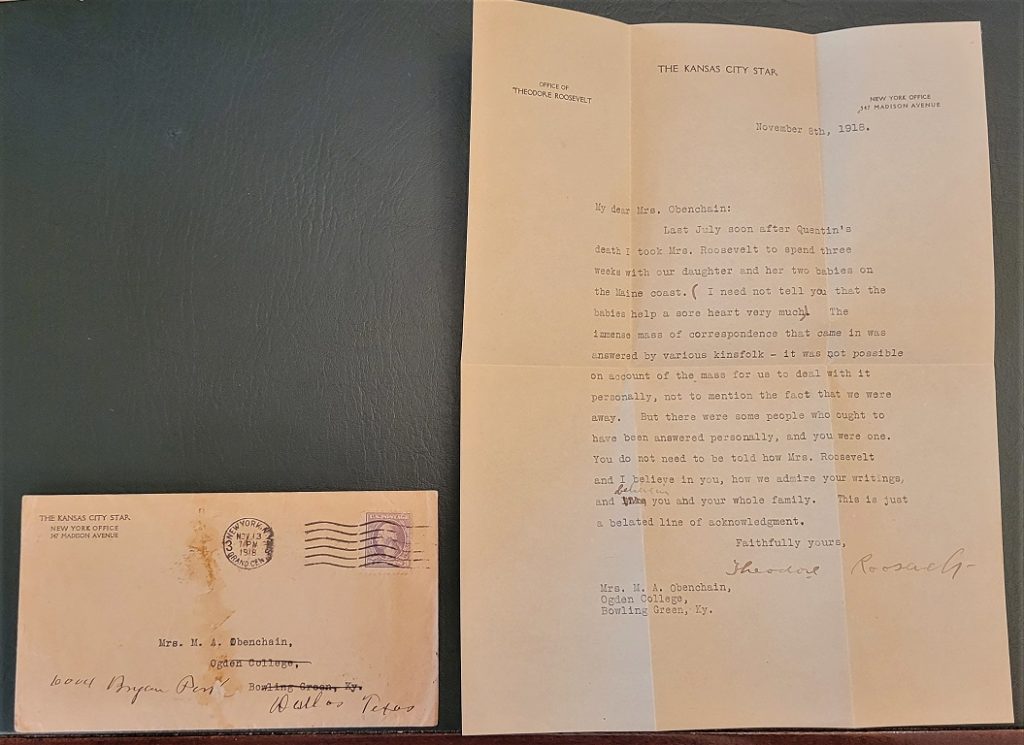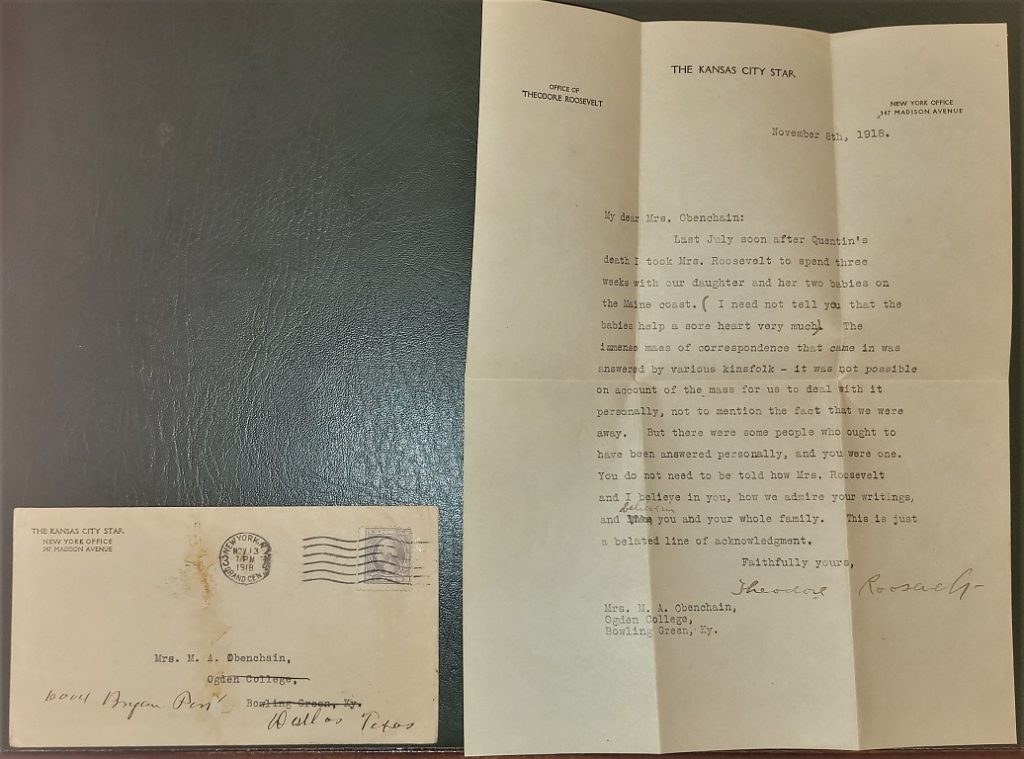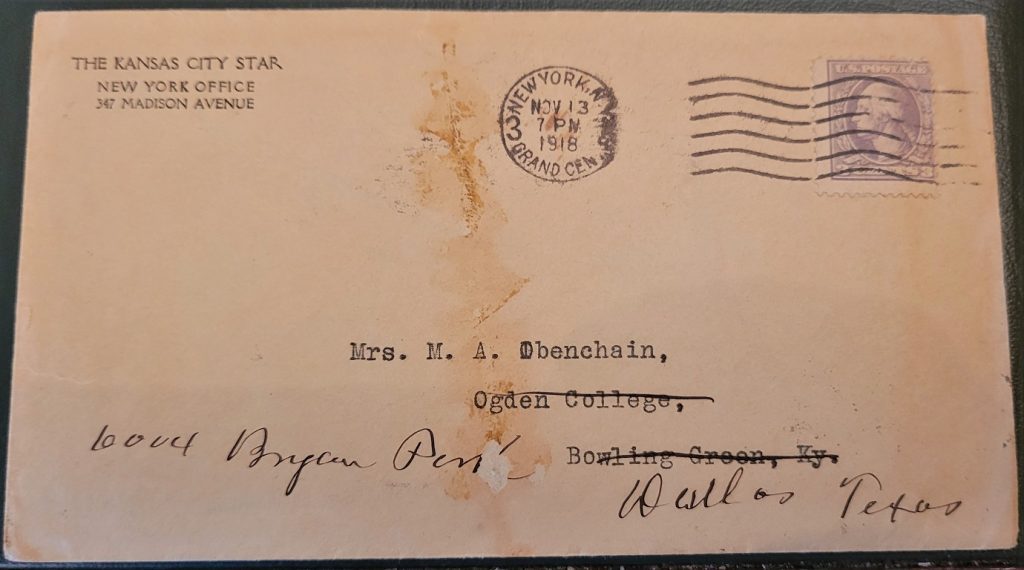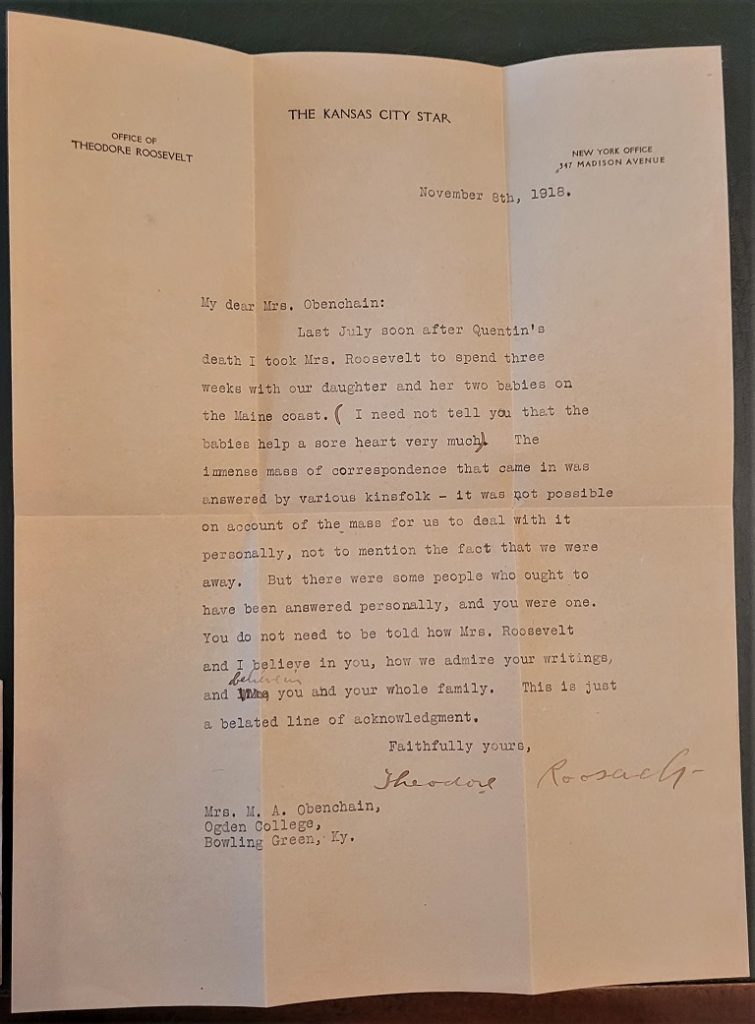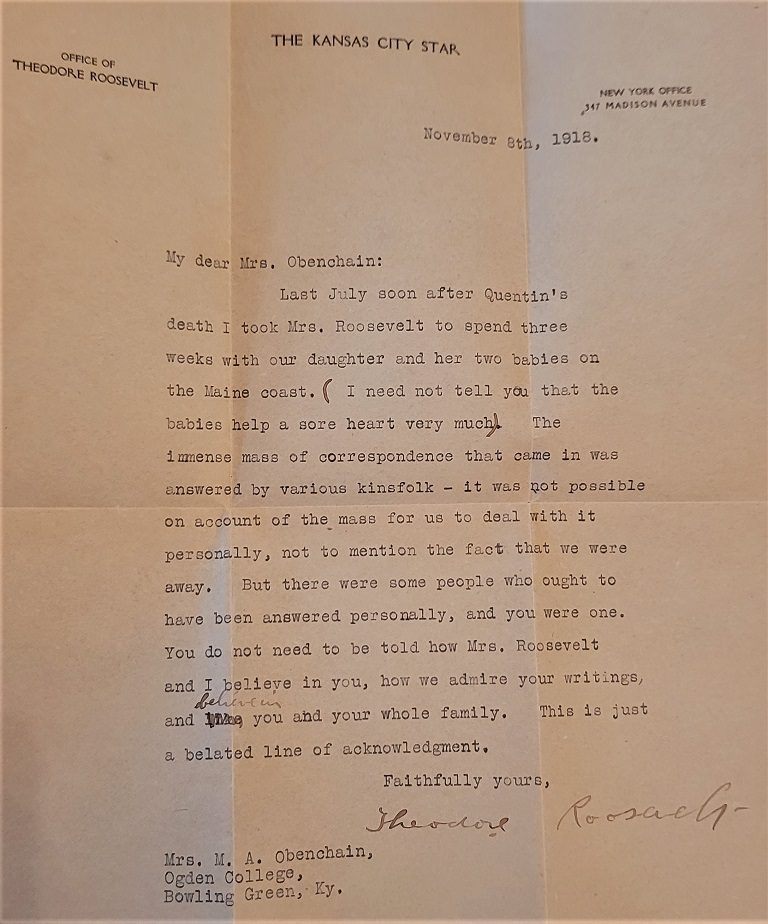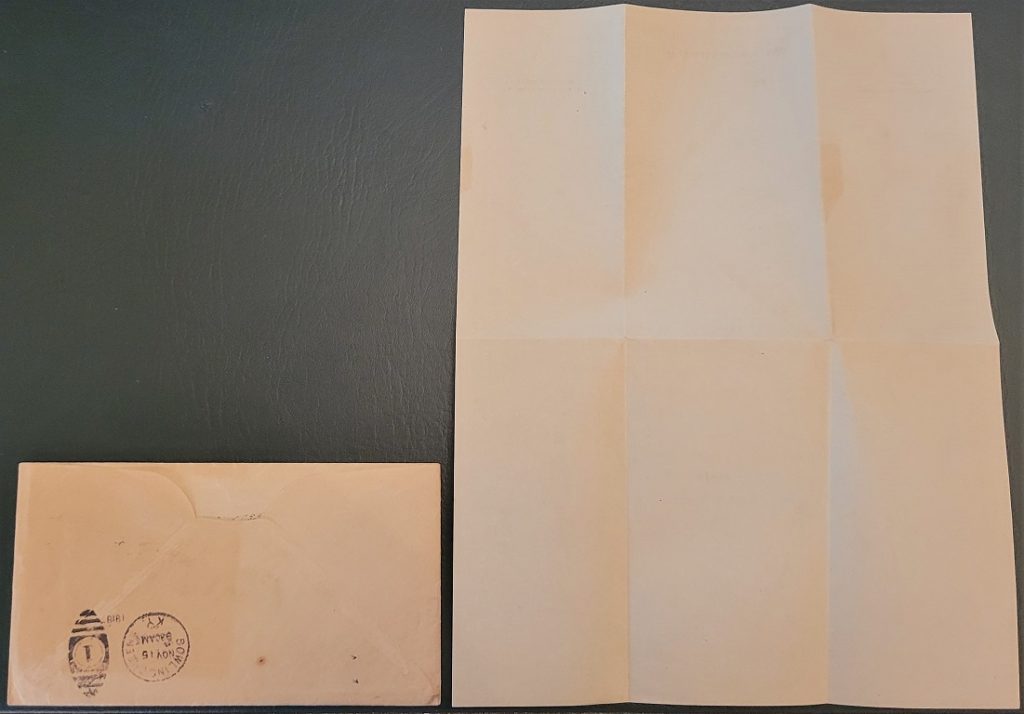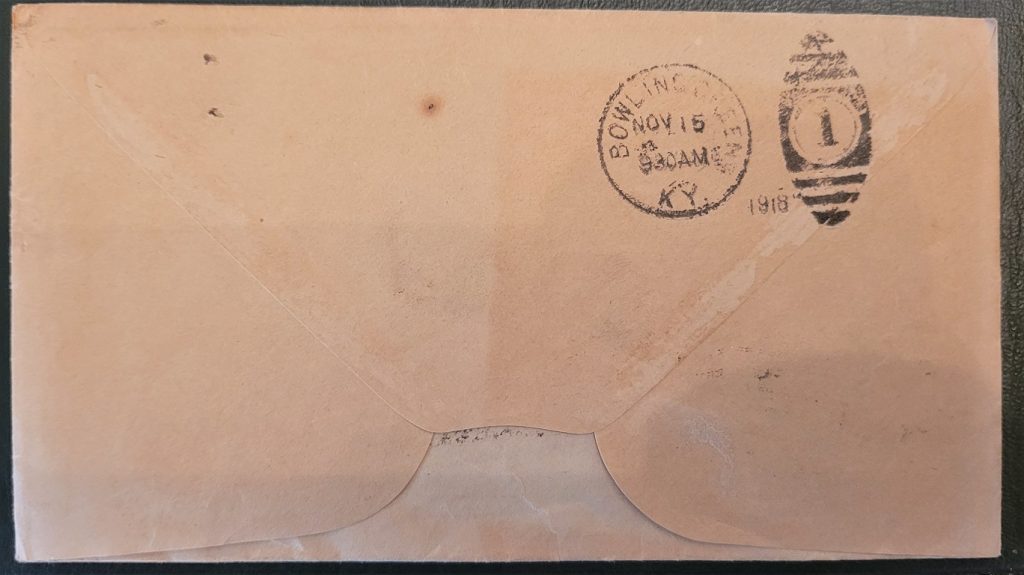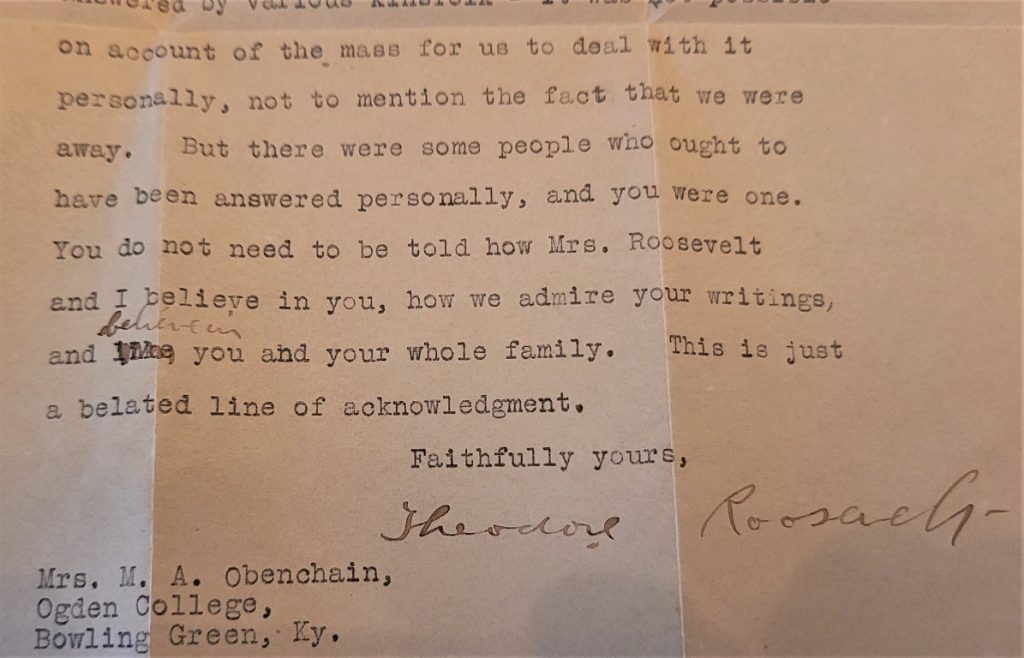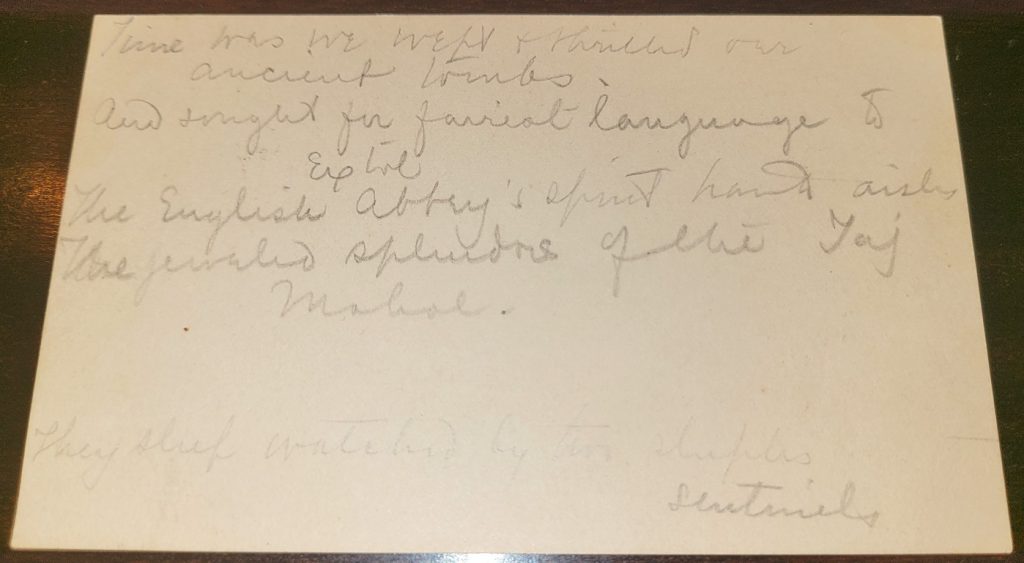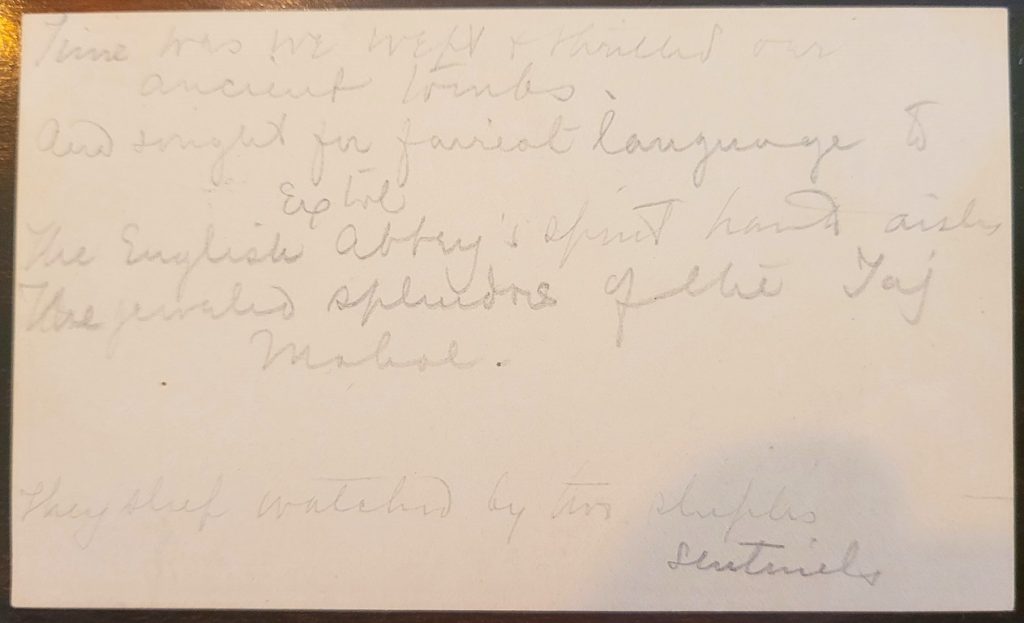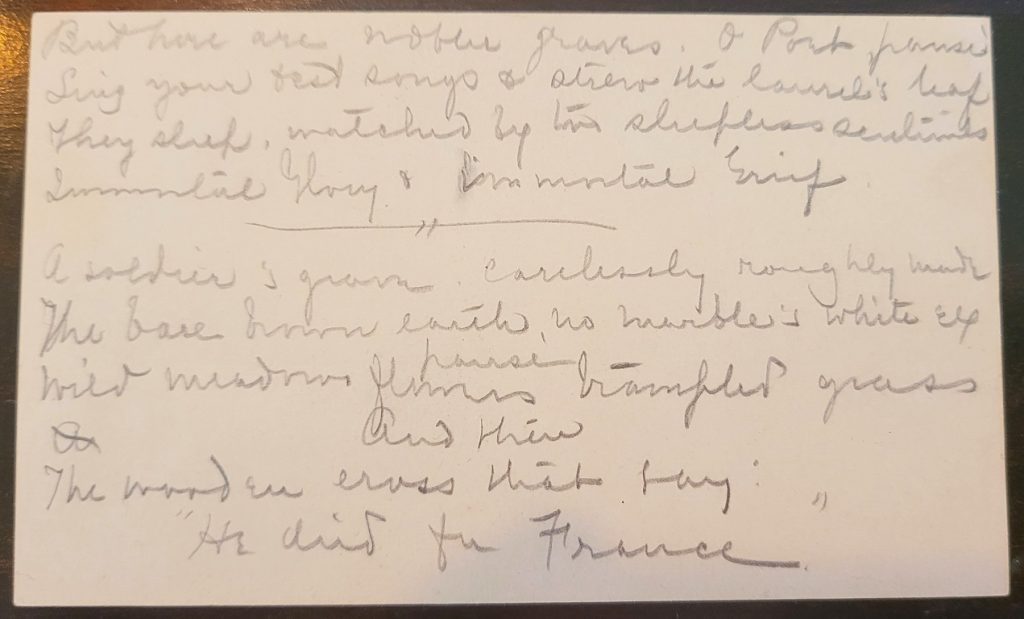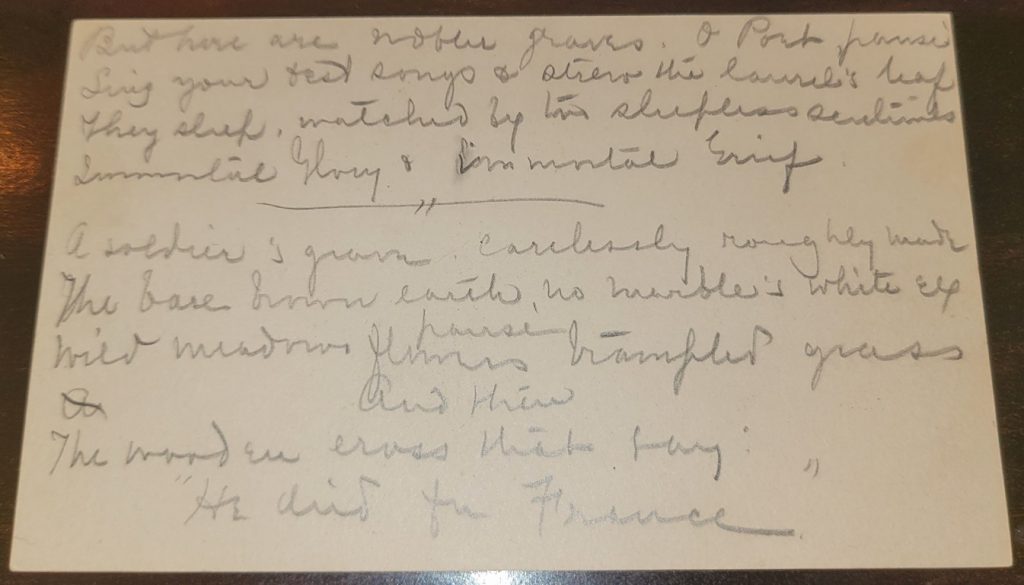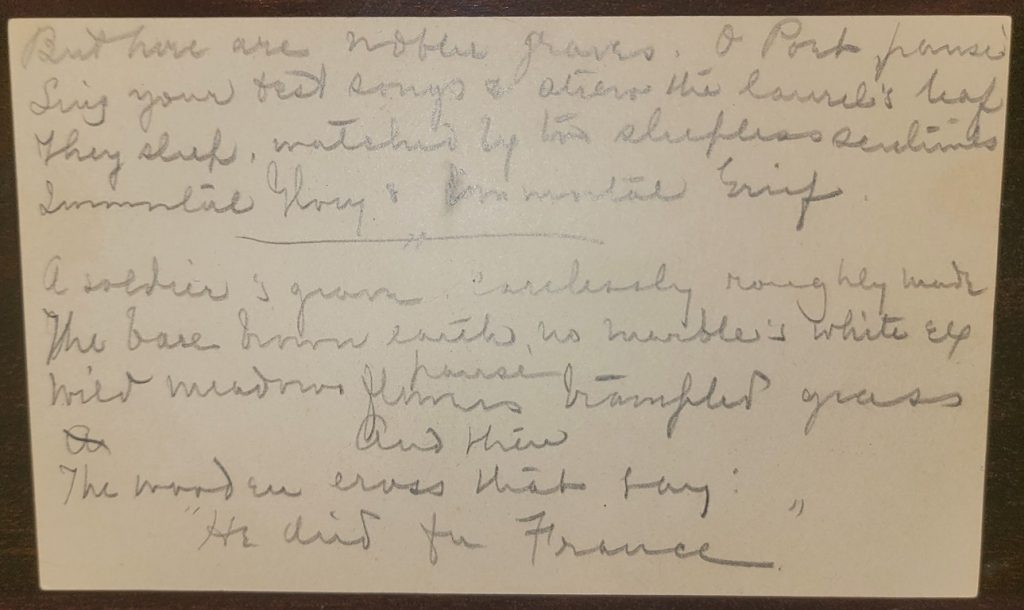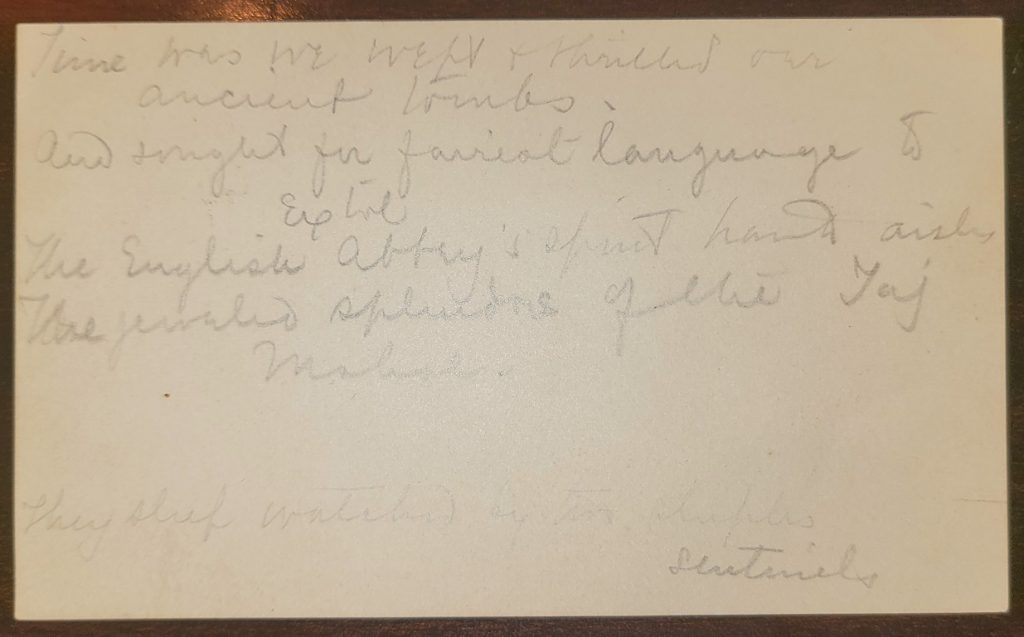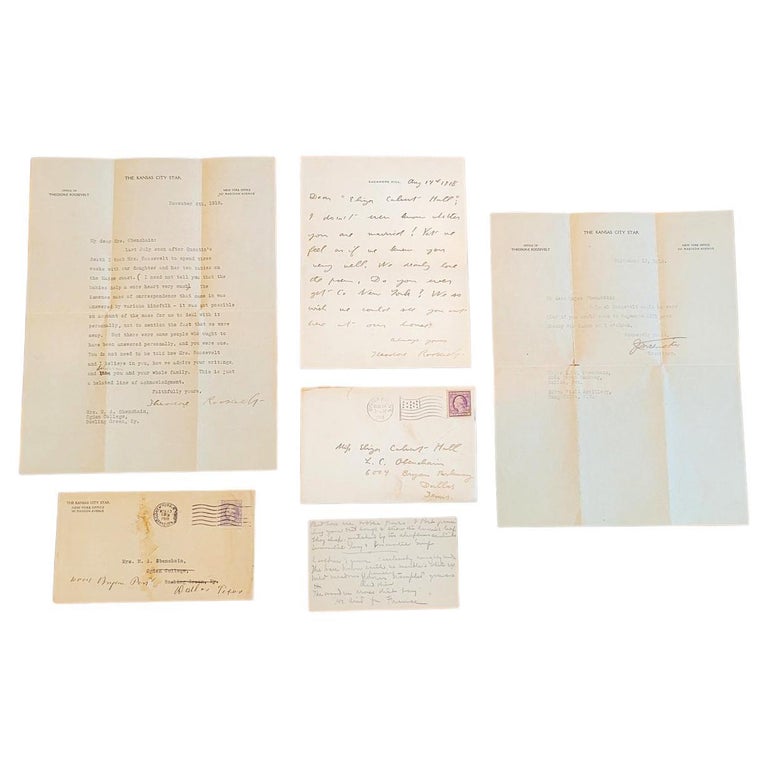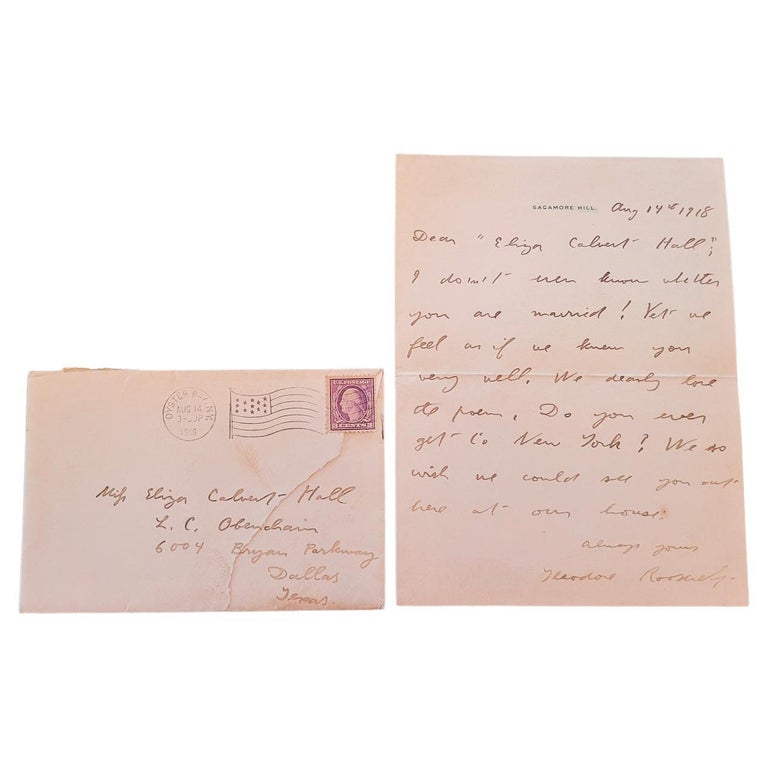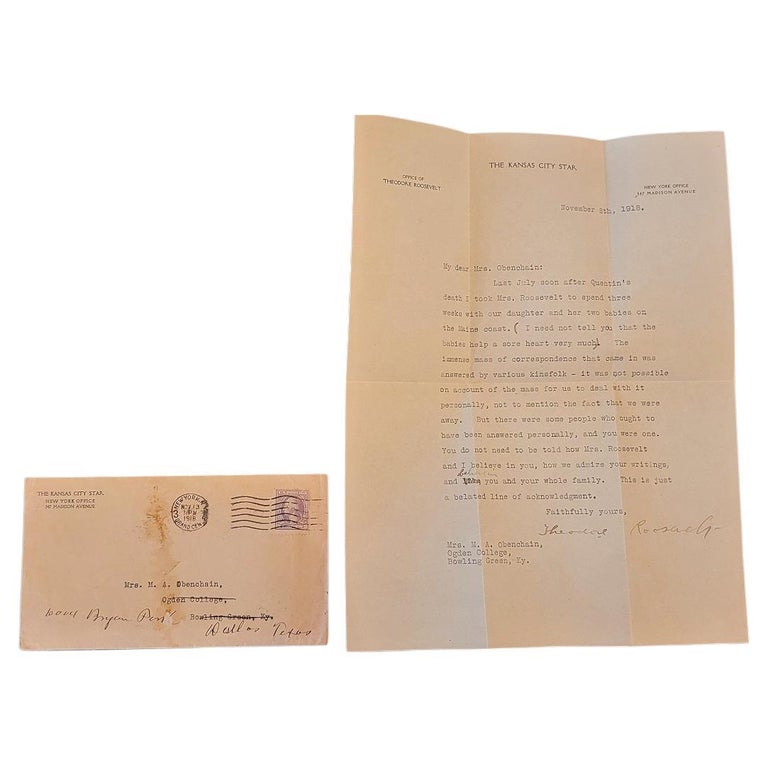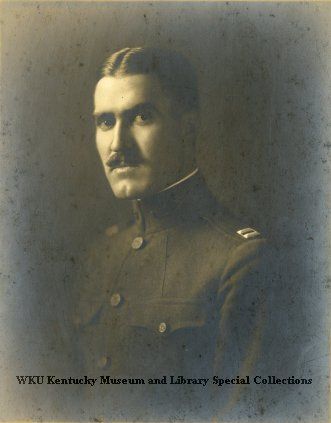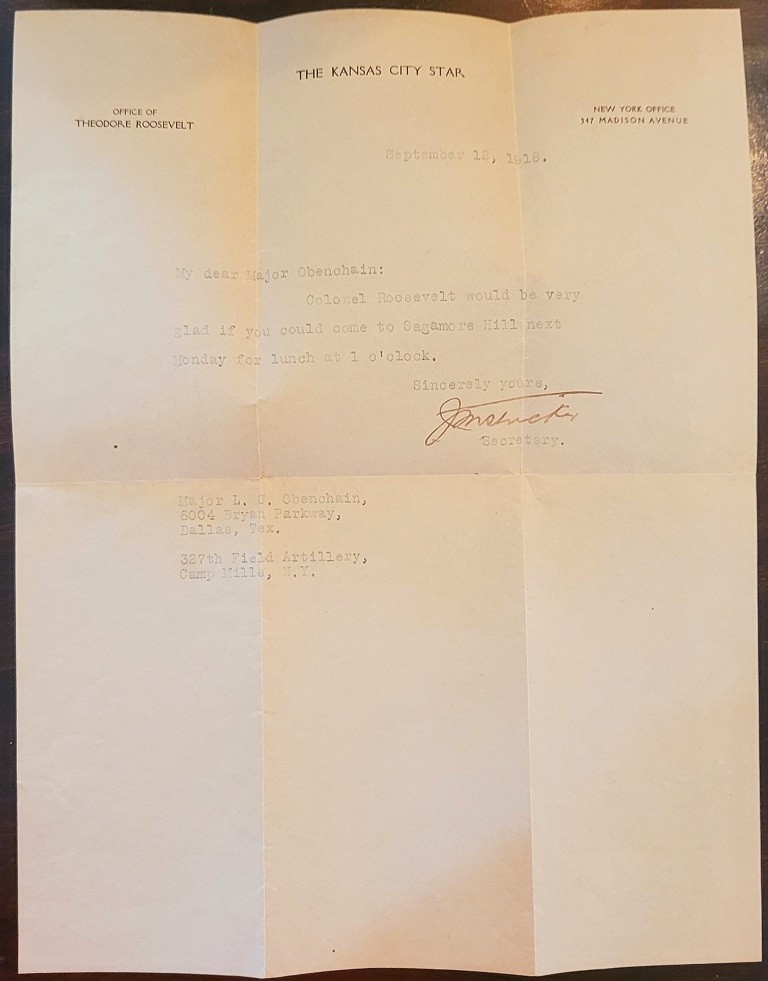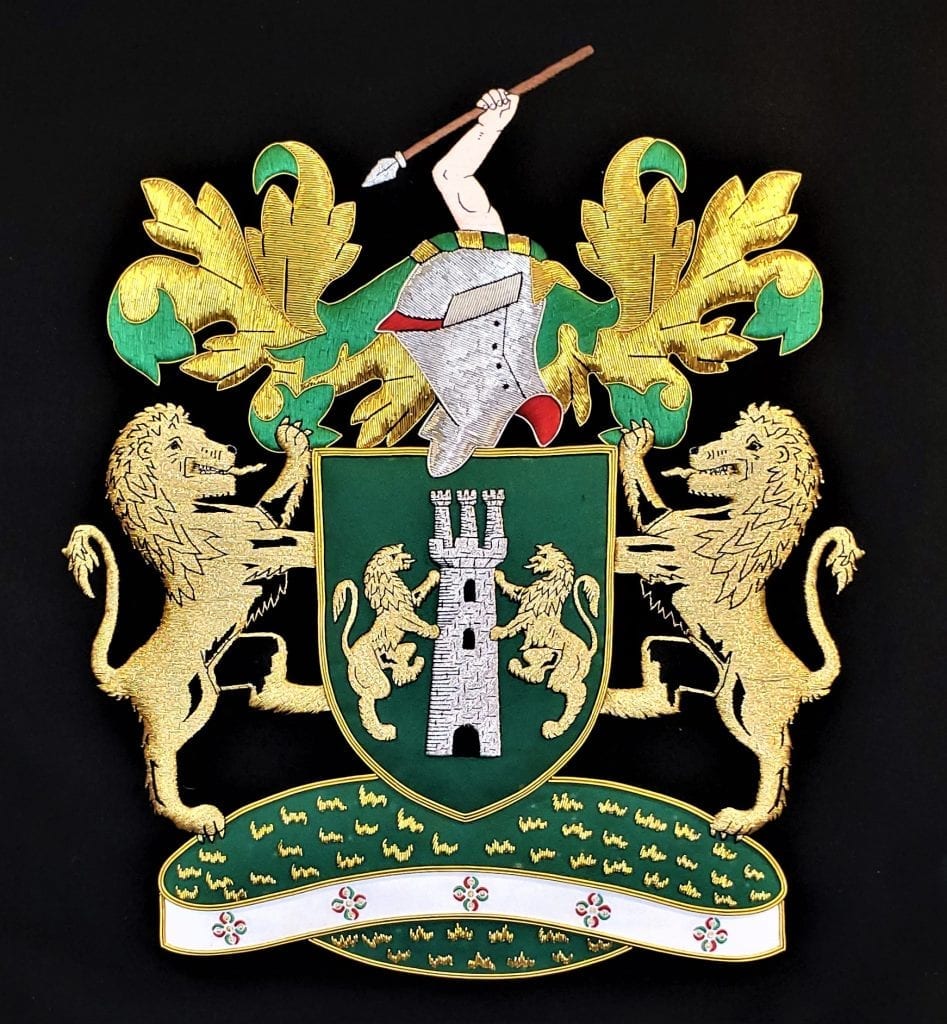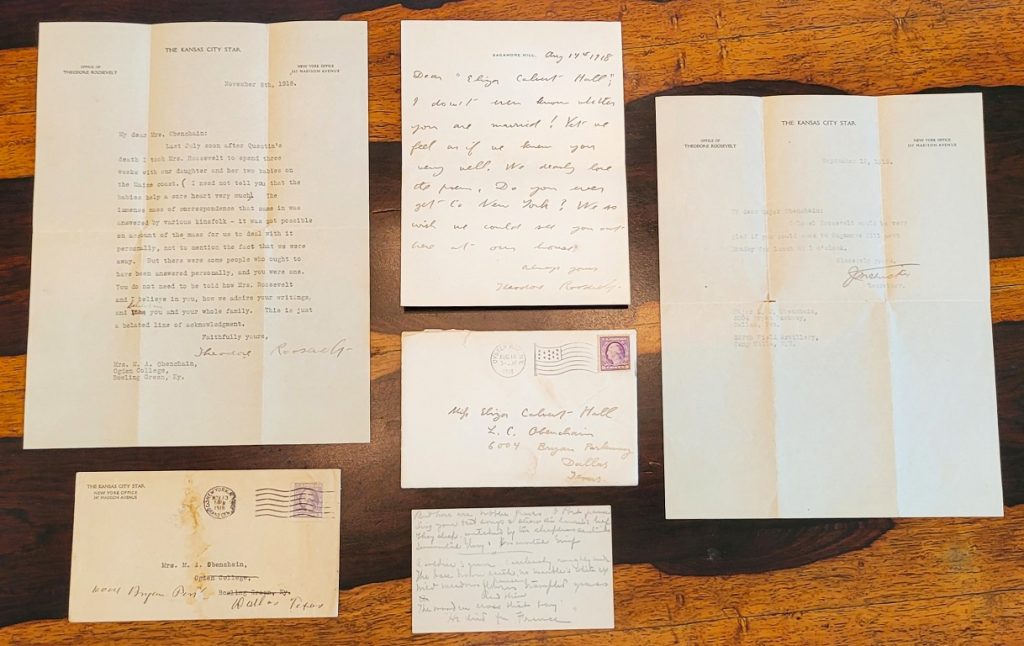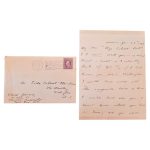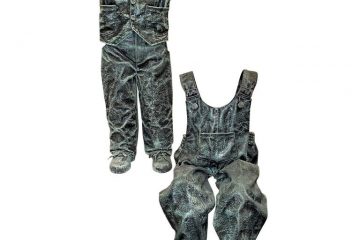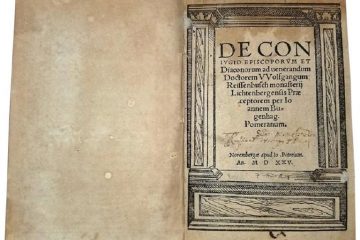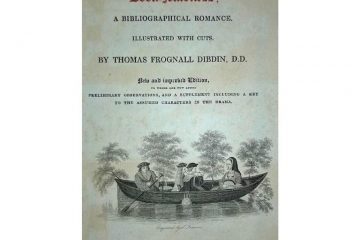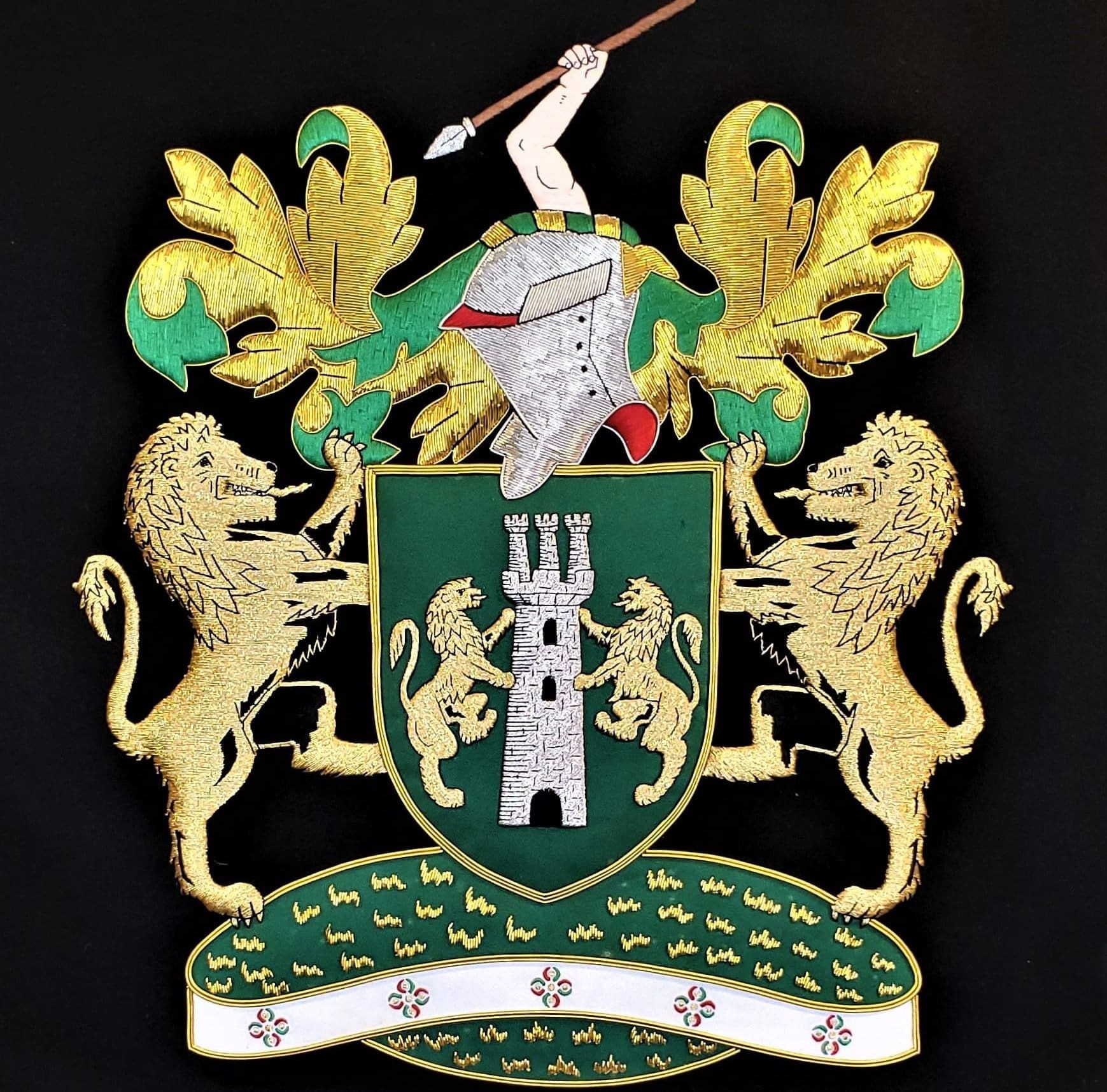Highly Important Theodore Roosevelt Collection of 6 Items
PRESENTING A HUGELY IMPORTANT, EXCEPTIONALLY RARE and FULLY AUTHENTIC COLLECTION of 6 Items pertaining to President Theodore Roosevelt, that have never been outside family ownership, namely:
(1) Original Theodore Roosevelt Letter 14th August 1918 to Eliza Calvert Hall,
(2) Original Envelope – Aug 1918, with postage stamps, marks, etc.
(3) Original Theodore Roosevelt Letter 8th November 1918 to Mrs Obenchain
(4) Original Envelope – Nov 1918, with postage stamps, marks, etc.
(5) HUGELY IMPORTANT handwritten ‘Poem’ on an Index Card by Eliza Calvert Hall which was sent by her to Theodore, after the death of Quentin in July 1918 and is referenced to by him, in the letter of August 1918, and
(6) Original letter dated 12 September 2018 to Maj LC Obenchain, which completes provenance/background.
(1) & (2) – PRESENTING AN EXCEPTIONALLY RARE and FULLY AUTHENTIC Theodore Roosevelt Letter from August 1918 with original envelope.
On ‘Sagamore Hill’ letterhead. Fully handwritten and personally signed by President Theodore Roosevelt.
Dated August 14th 1918.
With it’s original envelope, stamp and postage marks.
What makes this letter so important is the author, the office and the content.
It is addressed to Eliza Calvert Hall (C/O L.C. Obenchain) who was a well known author at the end of the 19th Century and Early 20th Century. In 1905, Theodore referred to her book “Aunt Jane of Kentucky’, in a Presidential Speech and recommended that every man in America should read it to understand ‘the plight of their womenfolk’.
He regularly corresponded with her and we have a number of those letters in our collection. It appears that both he and Edith became big fans of Mrs Calvert Hall/Obenchain who was also heavily involved in the Suffragist movement.
The letters also provide a fascinating and historic record of Roosevelt’s personal beliefs and feelings on female empowerment.
This letter reveals Teddy’s desire to meet the author in New York and have her visit Sagamore Hill.
The letter is a folded double folio with writing on the outside only.
The Letter Reads:
Sagamore Hill
Aug 14th, 1918
“Dear “Eliza Calvert Hall”;
I don’t even know whether you are married ! Yet we feel as if we know you very well. We dearly love the poem. Do you ever get to New York ? We so wish we could see you out here at our house.
Always yours,
Theodore Roosevelt“
The envelope is addressed to: Miss Eliza Calvert Hall, L.C. Obenchain, 6004 Bryan Parkway, Dallas, Texas
It is stamped on the front as posted from Oyster Bay, New York Post Office on August 14th 1918.
It has a purple 3 Cent ‘George Washington’ Postal Stamp.
(3) & (4) – PRESENTING AN EXCEPTIONALLY RARE & HIGHLY IMPORTANT and FULLY AUTHENTIC Theodore Roosevelt Letter from November 1918 with original envelope.
The Letter is on ‘The Kansas Star’ letterhead. Typed and personally signed and hand amended by Theodore Roosevelt.
With it’s original Kansas City Star envelope, stamp and postage marks.
Dated November 8th 1918.
What makes this letter so important is the content!
It refers to the recent death of Teddy’s youngest son, Quentin who died in combat in France in WW1 (July 1918) and the pain and mourning, of both he and Edith.
Historians and experts on Teddy, will tell you, that he did not like to talk about Quentin in public, as it was too painful and hurtful for him. Correspondence in which he does talk about Quentin are VERY, VERY RARE and are the MOST PRIZED items of Theodore Roosevelt’s Memorabilia.
Quentin’s death was a great personal loss to his father, who realized quite well that he had encouraged his son’s entry into the War. He never fully recovered from Quentin’s death and, within six months, was dead himself.
After Quentin’s grave came under Allied control, thousands of American soldiers visited it to pay their respects. It became something of a shrine and an inspiration to his comrades in arms.
The fact that he was being so ‘open’ to Lida, a mere 4 months after Quentin’s death, just shows the friendship that they had built between them, over a number of years.
It is ‘eerie’, also, that within 2 months of this letter and poem, he himself was dead.
It is addressed to Mrs Obenchain (AKA – Eliza Calvert Hall Obenchain) who was a well known author at the end of the 19th Century and Early 20th Century. In 1905, Teddy referred to her book “Aunt Jane of Kentucky’, in a Presidential Speech and recommended that every man in America should read it to understand ‘the plight of their womenfolk’.
He regularly corresponded with her and we have a number of those letters in our collection. It appears that both he and Edith became big fans of Mrs Obenchain, who was not just a famous author but was also heavily involved in the Suffragist movement.
Teddy had spent years trying to arrange a visit from her as is referred to in various letters in the Collection. Some of the other correspondence in the Collection (including telegrams) suggest that they did in fact, finally meet, in person, but we do not know when, but judging by the content of this letter it would have been just before Teddy passed, namely in the last 2 months of his life.
The various letters in the Collection also provide a fascinating and historic record of Roosevelt’s personal beliefs and feelings on female empowerment.
The Letter Reads:
“The Kansas City Star
The Office of Theodore Roosevelt
New York Office
347 Madison Avenue
November 8th, 1918
My dear Mrs. Obenchain,
Last July soon after Quentin’s death I took Mrs Roosevelt to spend three weeks with our daughter and her two babies on the Maine coast. (I need not tell you that the babies help a sore heart very much). The immense mass of correspondence that came in was answered by various kinsfolk – it was not possible on account of the mass for us to deal with it personally, not to mention the fact that we were away. But there were some people who ought to have been answered personally, and you were one. You do not need to be told how Mrs. Roosevelt and I believe in you, how we admire your writings, and believe in you and your whole family. This is just a belated line of acknowledgment.
Faithfully yours,
Theodore Roosevelt
Mrs. M.A. Obenchain,
Ogden College,
Bowling Green, Ky.“
The envelope is From: The Kansas City Star, New York Office, 347 Madison Avenue.
Addressed to: Mrs. M.A. Obenchain, Ogden College, Bowling Green, Ky but redirected to 10004 Bryan Park, Dallas, Texas.
Note: This was a spelling mistake and should have been Mrs. W.A. Obenchain …. this was quite common for Teddy in his later years, as he regularly made mistakes in people’s names, as is evident from various other letters by him that have appeared on the market or in museum collections.
It is stamped on the front as posted from New York Post Office at Grand Central on Nov. 13 1918.
It has a purple 3 Cent ‘George Washington’ Postal Stamp.
On the rear of the envelope is a stamp from Bowling Green, KY Post Office dated Nov 15 1918.
Obviously, the Bowling Green Post Office forwarded the letter to Mrs Obenchain who had now re-located to Dallas Texas.
The reference(s) by Teddy to “l need not tell you” and “babies” …. refers to Lida’s loss of her husband (Major William Alexander Obenchain) in August 1916 and her subsequent move to Dallas from Bowling Green, to be with her children and grandchildren and in particular, to care for her daughter Margery, who had contracted tuberculosis.
(5) BUT WAIT! JUST WHEN YOU THOUGHT IT COULD NOT GET ANY BETTER … WE PRESENT A unique and important hand-written poem/note on an index card, which we found in the original envelope of the Roosevelt Letter of August 1918 (above).
At first, we did not realize it’s significance and thought that it was merely a handwritten note or written memo by Eliza Calvert Hall.
Having dealt with hundreds of items in her estate, she would regularly write notes on index cards, which she would insert into books she possessed. She also wrote notes on the sides of letters, etc.
Then we thought that ‘maybe, just maybe’, it was a poem she wrote for Roosevelt, especially as she was an author and poet, BUT, surely, if she had written it for Teddy, then she would have sent it to him?
AND if she had sent it to him, then why would he have sent it back to her?
Also, using an index card as a means to pay tribute to such an important figure as Teddy and his son, would not make sense …. it is ‘way’ too informal?
SO, we decided to take a ‘MUCH CLOSER LOOK’ at it and the entire Collection AND having deciphered the content of the card and performing hand writing comparisons (and getting a ‘tad’ prematurely excited at one point, that it may have in fact, been written by Teddy himself …. in our defense … their respective handwriting styles were very similar! LOL), we are now 100% satisfied that it is the ‘hand’ of Lida.
Then we remembered the letter from Teddy to her of August 1918 (only a month after the death of Quentin) in which he says: “We dearly love the poem”.
EUREKA …. THIS IS THE POEM!
This was Lida’s ‘ORIGINAL DRAFT’ of the finished poem that she sent to Teddy and she kept it with the August Letter.
The ‘Finished Poem’ was sent by her, to The Roosevelts on August 10 1918 and the original envelope and 2 page poem, are with the Sagamore Hill National Historic Site and can be viewed on the Theodore Roosevelt Center Digital Library at:
Link: https://www.theodorerooseveltcenter.org/Research/Digital-Library/Record/ImageViewer?libID=o276637&imageNo=1
Lida had obviously placed the draft poem with the August 1918 envelope, which is where we found it.
It is written in pencil, on both sides of the index card and when we read and deciphered the CONTENT we were BLOWN AWAY!
The Poem reads:
“Time was we wept and thrilled o’er ancient tombs.
And sought for finest language to Extol.
The English Abbey’s spirit haunted aisles.
Or jeweled splendors of the Taj Mahal.
They sleep watched by two staples
Sentinels.
But here are noble graves. O Part paused.
Sing your best songs and stress the laurel’s leaf.
They sleep, watched by the sleepless sentinels.
Immortal Glory & Immortal Grief
“
A soldiers grave, carelessly roughly made.
The bare brown earth, no marble’s white expanse,
Wild meadow flowers (pause) trampled grass
and then
The wooden cross that say:
“He died for France”
TO FIND THE ‘ORIGINAL DRAFT’ OF THE POEM, BY THE ORIGINAL AUTHOR, (THE SOURCE OF POETIC INSPIRATION) THAT WAS THEN FINALISED BY HER AND SENT TO THE ROOSEVELT’S,
AND THE ONLY KNOWN COPY HELD WITH THE ROOSEVELT CENTER LIBRARY,
IS QUITE SIMPLY A STUNNING & IMPORTANT DISCOVERY!
This is an outstanding piece of writing/poetry, by a well known author and poet of the day, much admired by the Roosevelt’s and a noted figure in the late 19th and early 20C Women’s Suffrage Movement.
Eliza (Lida) Calvert Hall Obenchain, personally sent this to Teddy & Edith in August 1918, expressing her personal condolences, by way of tribute to Quentin (who had only passed away less than a month previous), in poetic form.
This was a DEEPLY PERSONAL ‘TOUCH‘ by her and much appreciated by the Roosevelt’s, as evidenced by the August letter.
The Poem that was sent to the Roosevelt’s, is headed “Quentin Roosevelt” and signed by “Eliza Calvert Hall”.
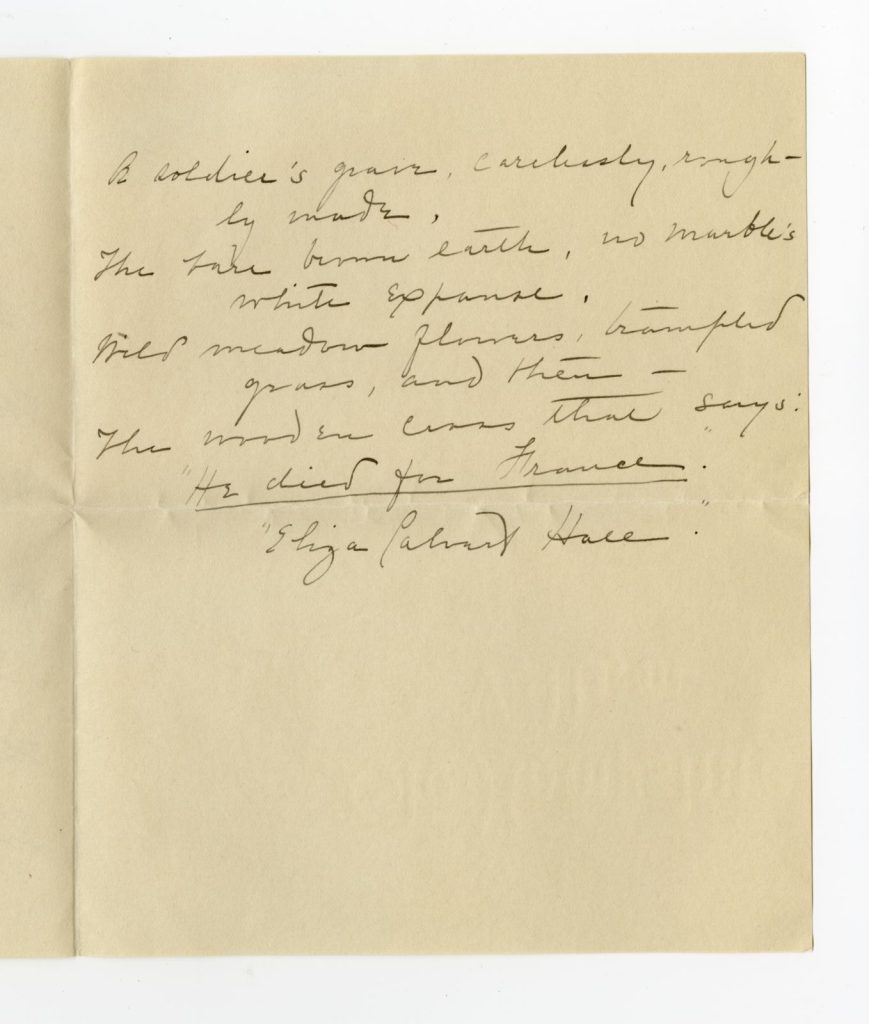

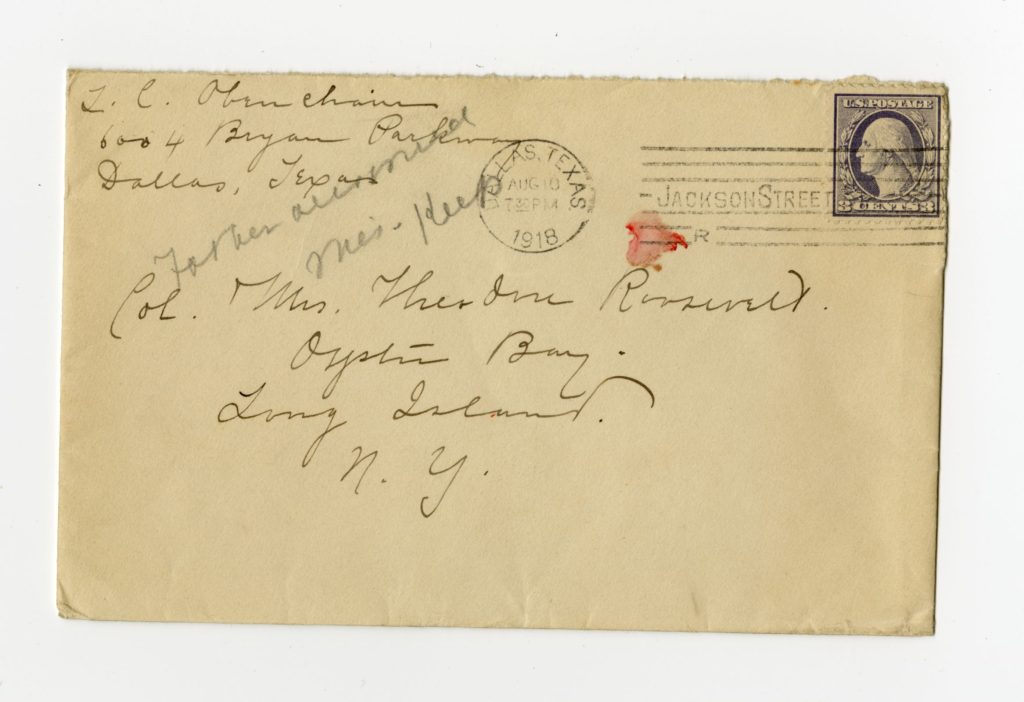

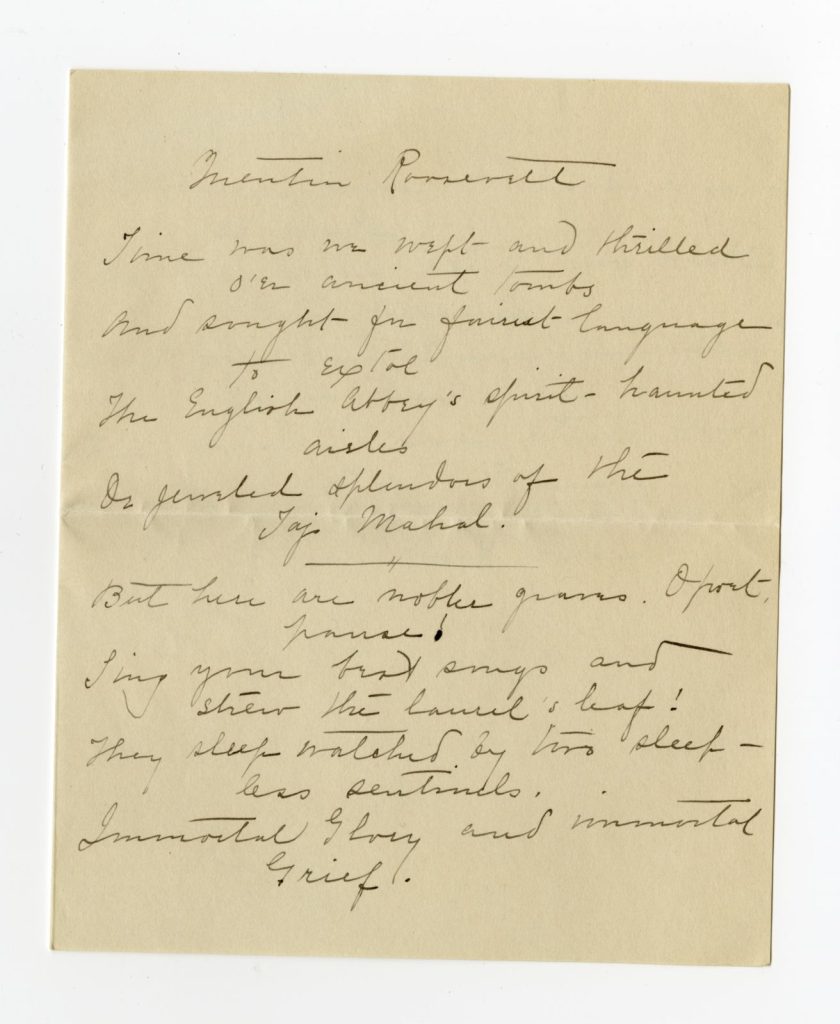

We knew that the November Letter was very valuable (on it’s own) because of the mention by Theodore of Quentin’s death and his and Edith’s personal pain and grief BUT when you have a collection of 6 ORIGINAL & FULLY AUTHENTIC items that complete a FULL story/picture of The Roosevelt’s pain, grief and mourning, after Quentin’s death, composed in the short few months thereafter and the imminent passing of Teddy himself looming, THEN, all this, just sends the value of this Collection, into the stratosphere!!!
Similar single typed letters, personally signed by Theodore, which reference Quentin’s death, have sold at Auction – Heritage & Christies for between $60,000 and $85,000. But NONE of those come close to this Collection and in particular the personal and unique revealing content!
THIS COLLECTION SHOULD REALLY BE IN A MUSEUM ..
AND MAYBE THAT IS WHERE IT WILL END UP ….
BUT, IF YOU ARE A PRIVATE COLLECTOR OF ‘ROOSEVELT MEMORABILIA’,
THEN THIS IS A GOLDEN OPPORTUNITY!
(6) PRESENTING A RARE and FULLY AUTHENTIC Office of Theodore Roosevelt Letter from September 1918 to Major LC Obenchain.
The ‘timing’ of the November letter to Lida Calvert Hall Obenchain, is further made relevant by, a luncheon Roosevelt had with Lida’s son, Major L.C. (Alex) Obenchain at Sagamore on Monday the 16th September 1918.
This luncheon is confirmed in this letter from The Office of Theodore Roosevelt and The Kansas City Star dated 12th September 1918 addressed to “Major L.C. Obenchain, 6004 Bryan Parkway, Dallas, TX – 387th Field Artillery, Camp Mills, N.Y.” Signed by Roosevelt’s Secretary and confirming the luncheon date.
Major L.C. Obenchain (also known as ‘Alex”) 1888-1938, was Lida’s eldest son who served in the 387th Field Artillery and saw action in WW1.
It is not difficult to deduce, that Roosevelt’s meeting with Alex (a WW1 Veteran), brought up memories of ‘Quentin’ and led to Roosevelt writing the letter to Lida in November.
THE LETTER READS:
“September 12, 1918
My dear Major Obenchain,
Colonel Roosevelt would be very glad if you could come to Sagamore Hill next Monday for lunch at 1 o’clock.
Sincerely yours,
??????
Secretary
Major L.C. Obenchain,
6004 Bryan Parkway,
Dallas, TX
327th Field Artillery,
Camp Mills, N.Y.”
In an interesting ‘twist’ ….. (L.C.) Alex came to a very ‘unfortunate end’, in that, his body was found on Dec 2, 1938, 8 miles below Alexandria, LA, in a thicket near the bank of the Red River. According to the The Town Talk (Alexandria, LA newspaper), cause of death was determined to be death from a .38 caliber bullet to the head. It was ruled a murder by the coroner’s jury and was never solved.
Theodore Roosevelt Jr. (/ˈroʊzəvɛlt/ ROH-zə-velt; October 27, 1858 – January 6, 1919), often referred to as Teddy or his initials T. R., was an American politician, statesman, conservationist, naturalist, historian, and writer who served as the 26th president of the United States from 1901 to 1909. He previously served as the 25th vice president under William McKinley from March to September 1901, and as the 33rd governor of New York from 1899 to 1900. Having assumed the presidency after McKinley’s assassination, Roosevelt emerged as a leader of the Republican Party and became a driving force for anti-trust and Progressive policies.
Roosevelt was a sickly child with debilitating asthma but partly overcame his health problems by embracing a strenuous lifestyle. He integrated his exuberant personality, a vast range of interests and achievements into a “cowboy” persona defined by robust masculinity. He was home-schooled and began a lifelong naturalist avocation before attending Harvard. His book The Naval War of 1812 (1882) established his reputation as a learned historian and popular writer. Upon entering politics, he became the leader of the reform faction of Republicans in New York’s state legislature. His wife and mother both died in the same night and he was psychologically devastated. He recuperated by buying and operating a cattle ranch in the Dakotas. He served as Assistant Secretary of the Navy under President William McKinley and in 1898 helped plan the highly successful naval war against Spain. He resigned to help form and lead the Rough Riders, a unit that fought the Spanish army in Cuba to great publicity. Returning a war hero, he was elected governor of New York in 1898. The New York state party leadership disliked his ambitious agenda and convinced McKinley to make Roosevelt as his running mate in the 1900 election. Roosevelt campaigned vigorously, and the McKinley–Roosevelt ticket won a landslide victory based on a platform of victory, peace and prosperity.
Roosevelt assumed the presidency at age 42 after McKinley was assassinated in September 1901. He remains the youngest person to become President of the United States. Roosevelt was a leader of the progressive movement and championed his “Square Deal” domestic policies, promising the average citizen fairness, breaking of trusts, regulation of railroads, and pure food and drugs. He prioritized conservation and established national parks, forests, and monuments intended to preserve the nation’s natural resources. In foreign policy, he focused on Central America where he began construction of the Panama Canal. He expanded the Navy and sent the Great White Fleet on a world tour to project American naval power. His successful efforts to broker the end of the Russo-Japanese War won him the 1906 Nobel Peace Prize. Roosevelt was elected to a full term in 1904 and continued to promote progressive policies. He groomed his close friend William Howard Taft to succeed him in the 1908 presidential election.
Roosevelt grew frustrated with Taft’s brand of conservatism and belatedly tried to win the 1912 Republican nomination for president. He failed, walked out, and founded the Progressive Party. He ran in the 1912 presidential election and the split allowed the Democratic nominee Woodrow Wilson to win the election. Following the defeat, Roosevelt led a two-year expedition to the Amazon basin where he nearly died of tropical disease. During World War I, he criticized Wilson for keeping the country out of the war; his offer to lead volunteers to France was rejected. He considered running for president again in 1920, but his health continued to deteriorate. He died in 1919. He is generally ranked in polls of historians and political scientists as one of the five best presidents.
Link: https://en.wikipedia.org/wiki/Theodore_Roosevelt
Quentin Roosevelt I (November 19, 1897 – July 14, 1918) was the youngest son of President Theodore Roosevelt and First Lady Edith Roosevelt. Inspired by his father and siblings, he joined the United States Army Air Service where he became a pursuit pilot during World War I. He was killed in aerial combat over France on Bastille Day (July 14), 1918. He is the only child of a U.S. president to have died in combat.
Link: https://en.wikipedia.org/wiki/Quentin_Roosevelt
DO NOT PROCRASTINATE ON THIS COLLECTION
….. IT WILL BE IN ‘HUGE’ DEMAND!
THE LEADING EXPERT ON AMERICAN HISTORICAL MEMORABILIA, WITH HERITAGE AUCTIONS, HAS SEEN THESE IN PERSON, WAS IN NO DOUBT OF THEIR AUTHENTICITY AND WAS ‘DROOLING’ AT THE PROSPECT OF HERITAGE SELLING THEM!
Highly Important Theodore Roosevelt Collection of 6 Items:
(1) Original Teddy Roosevelt Letter 14th August 1918 to Eliza Calvert Hall,
(2) Original Envelope – Aug 1918, with postage stamps, marks, etc.
(3) Original Teddy Roosevelt Letter 8th November 1918 to Mrs Obenchain
(4) Original Envelope – Nov 1918, with postage stamps, marks, etc.
(5) HUGELY IMPORTANT handwritten ‘Poem’ on an Index Card by Eliza Calvert Hall which was sent by her to Teddy, after the death of Quentin in July 1916 and is referenced to by him, in the letter of August 1918 and was returned to her by Teddy and included in the original envelope of August 1918, and
(6) Original letter dated 12 September 2018 to Maj LC Obenchain, which completes provenance/background.
Provenance: From the Eliza Calvert Hall Estate. Never seen outside of the family … until now!
Condition: Very Good. Some discoloration (yellowing of paper) through passage of time. Some staining on the front of Nov envelope. No tears to November letter. Some minor tears to September letter. Aug envelope has a tear across the front. None of these minor defects adversely affect the pieces. All 6 items are kept in an acid free plastic pouch.
Dimensions: Nov Envelope is 6.5 inches wide and 3.65 inches tall
The November Letter is: 8.5 inches wide and 11.2 inches tall.
The Aug Envelope is 6 inches wide and 4 inches tall
The September Letter is: 8.5 inches wide and 11.2 inches tall.
The Index Card/Poem is 5 inches wide and 3 inches Tall.
SALE PRICE NOW: $120,000 (Complete Set of 6 Items)
